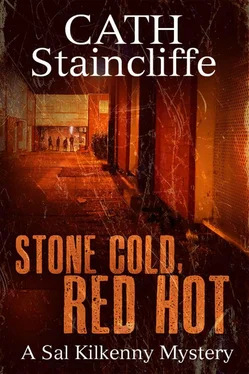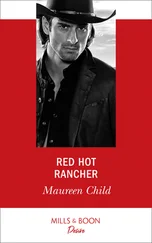“I’d no idea she was like that,” Caroline continued, “if I’d known when we were at school.” She twisted her mouth with distaste. “We slept at each others houses and everything. I hadn’t a clue. It’s the husband I feel sorry for, getting married and then…what he must have been through.”
I stared at her. How the hell did she know I wasn’t ‘like that’ too? I was more than eager to conclude my interview with Caroline Cunningham. She had rapidly become my least favourite of Jennifer’s friends. But I still had a few more questions to ask her.
“When did you last see Jennifer?”
“Before I went on holiday to Brittany.”
“So you didn’t see her before she left for Keele?”
“No. Should have done though. It was my birthday on the 14th. We were all going to go for a meal and then onto the Ritz in town. We’d been planning it for ages. Sort of last fling before we all went off to uni. She never came. I was a bit pissed off to be honest. But then when I heard about the baby I thought maybe she couldn’t face it. She could have sent a card or something though. It’s like she just gave up on everybody. Who needs friends like that?”
“Perhaps she’d gone for an abortion, thought people would disapprove.”
“Not us. Well, apart from Frances who was holier than thou about things like that. There were two girls in school had abortions in the sixth form, everyone knew. It was OK. People felt sorry for them.”
“So why do you think Jennifer dropped all her friends? Never got in touch.”
She shrugged. “Because we reminded her of home, of her parents? She wanted a new start? Who knows? We thought it was quite exciting at the time, once it turned out that she’d left the university and she wouldn’t tell anyone where she was living. Romantic. Jenny cutting herself off from her family. I think we imagined her swanning back when she’d made a success of her life, rubbing their noses in it, but she never did, did she? Sank without trace.”
“Did Jennifer ever talk about wanting to live in a particular place, somewhere she’d go if she got the chance?”
“No, not that I remember,” she fished for a tissue and wiped her nose.
“Were there any friends or family you heard of in other places?”
“No. I don’t think they had any other family. No aunties and uncles and that. Her mother had been an only child and she’d grown up on a farm miles from anywhere. Jennifer reckoned that’s partly why she was so strict because of her own upbringing.”
“But they let her go off to Knebworth, didn’t they?” I recalled the snapshots of Jennifer and Lisa by their tent.
“She never told them it was Knebworth. They thought the pair of them were camping in the Peak district. Girl Guide stuff.”
I nodded. I checked back over my notes to see if I’d missed anything. “Well, I think that’s about it. Thanks for seeing me.” I got to my feet.
“Have you seen Frances?”
“Tomorrow.”
“She never left Manchester, did her course there, got a job, then the wedding and started a family. Seems happy enough. And it’s Roger Pickering who wants you to find Jennifer?”
“Yes.”
“John and Roger were at school together,” she said, “he was always painfully shy. They say he’s doing quite well for himself now, in computers. Surprising really,” she blew her nose.
I waited to see if there was going to be any further significance to her mean little observations but she didn’t add anything. I didn’t feel any compunction to give any more away to Caroline. More grist for her gossip mill. Besides which Roger was my client and I had a duty to respect confidentiality in my work.
I said a brisk goodbye and she saw me out.
I stood by my car for a minute, let my eyes wander over the view, breathed in the cold air to take away the dirty feeling I’d picked up during the encounter.
Once I was back on the road heading for Snake Pass I felt as though I’d escaped from something. It was hard to imagine how Caroline and Lisa could have got along so well at school. Maybe Caroline’s insidious opinions hadn’t been formed back then, maybe she’d been corrupted at university, falling in with the wrong crowd, flirting with the fascists, learning to see everyone else as different, inferior, threatening. I wondered how she would judge the antics of the Brennans and the Whittakers. I thought she’d probably be appalled – not recognising that her own attitudes helped create a climate in which their violent racism could flourish.
I was up on the hilltops when my mobile rang. I pulled into a passing place and stopped the car to take the call.
“It’s Lisa MacNeice here, you said to ring if I thought of anything,” her voice was tinny on the phone.
“Yes?”
“Well, I remembered something, I’ve been thinking about it all since you came…I can’t see how it’ll help, though.”
“Go on.”
“It was on the phone, not long before Jenny went. She was upset, I thought it was about the pregnancy and everything but she kept calling her father a hypocrite, she wouldn’t say why. She was really angry.”
It was hardly a big break.
“Was it unusual, her calling him names, getting upset?”
“Well, she called him all sorts, you know what teenagers are like. He was big on morals and what he called decent behaviour and all that and she hated his conservatism, his prejudice. But this felt different. She rang me up to tell me, for a start and at first I thought she’d told him about the baby and he’d been horrible about it and she was calling him a hypocrite because he wasn’t being a Christian and forgiving her. Mind you his particular Church never seemed very tolerant.”
“Maybe he told her to get an abortion?” I suggested.
“Yes, that would fit. But the thing is, I asked Jenny if she’d told them and she said no, not yet. She said it was something else.”
“You got the impression something had happened, her father had said something or done something that she thought was hypocritical?”
“Yes.”
“But not connected to her pregnancy?”
“No.”
“And this was just before she left?”
“Yes, it’s so hard to be sure after all these years but it was one of the last times we spoke, if not the last. At the time you’re just talking you don’t expect to be quizzed on it decades after, you don’t know it might be important.”
“I know,” I reassured her, “you’ve done well to remember it at all. And if anything else comes up do call me.”
There was no milk at the office so I called home for some and collected a cheese and vegetable pastie that had come of age. If I didn’t eat it for lunch I’d have to bin it. There was a bank statement and a wodge of junk mail for me in the Dobson’s hall-way. Somehow my name had reached a list in catalogue land and I was being bombarded with free gift offers, new customer bribes and the promise of 250,000 pounds in cash or 5,000 per year for life if I’d only take a catalogue and buy something. I dumped everything but the bank statement. I made a coffee before I opened it. I looked at it, closed my eyes and took a rallying breath then filed it. It wouldn’t seem so bad in a couple of days.
I updated my notes and rang Roger Pickering. It was about time I told him what I’d found out about his sister. We arranged to meet the following day after I’d seen Frances Delaney. I wondered whether that would be a waste of time but unlike Caroline Cunningham she lived locally so it needn’t take me long to see her and then I’d have finished with Jennifer’s friends. I worked on a draft report for Roger so he could see what I’d been doing with his money. Would he want to retain me when I was getting nowhere fast? I’d have to be honest with him about my fading hopes. Even if Keele did give me Jennifer’s forwarding address there would be twenty odd years of moving house to trace and pursue. It would be time-consuming and there’d be no guarantee of success.
Читать дальше












